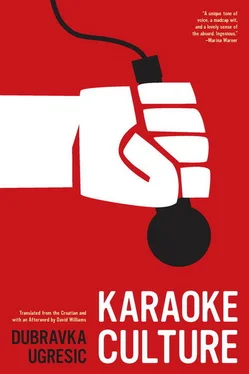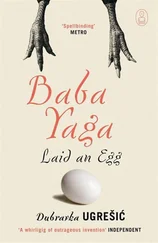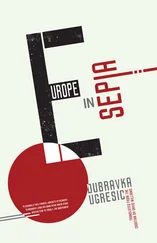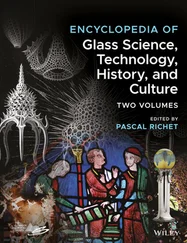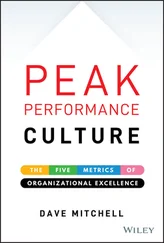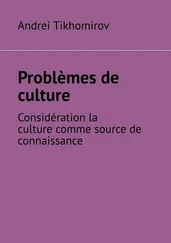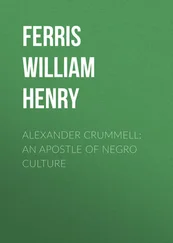Dubravka Ugresic - Karaoke Culture
Здесь есть возможность читать онлайн «Dubravka Ugresic - Karaoke Culture» весь текст электронной книги совершенно бесплатно (целиком полную версию без сокращений). В некоторых случаях можно слушать аудио, скачать через торрент в формате fb2 и присутствует краткое содержание. Год выпуска: 2011, Издательство: Open Letter, Жанр: Публицистика, на английском языке. Описание произведения, (предисловие) а так же отзывы посетителей доступны на портале библиотеки ЛибКат.
- Название:Karaoke Culture
- Автор:
- Издательство:Open Letter
- Жанр:
- Год:2011
- ISBN:нет данных
- Рейтинг книги:4 / 5. Голосов: 1
-
Избранное:Добавить в избранное
- Отзывы:
-
Ваша оценка:
- 80
- 1
- 2
- 3
- 4
- 5
Karaoke Culture: краткое содержание, описание и аннотация
Предлагаем к чтению аннотацию, описание, краткое содержание или предисловие (зависит от того, что написал сам автор книги «Karaoke Culture»). Если вы не нашли необходимую информацию о книге — напишите в комментариях, мы постараемся отыскать её.
Karaoke Culture — читать онлайн бесплатно полную книгу (весь текст) целиком
Ниже представлен текст книги, разбитый по страницам. Система сохранения места последней прочитанной страницы, позволяет с удобством читать онлайн бесплатно книгу «Karaoke Culture», без необходимости каждый раз заново искать на чём Вы остановились. Поставьте закладку, и сможете в любой момент перейти на страницу, на которой закончили чтение.
Интервал:
Закладка:
The novels The Return of Philip Latinowicz (Povratak Filipa Latinovicza, 1932) and On the Edge of Reason (Na rubu pameti , 1937) by Miroslav Krleža are the literary crown of the Croatian Kakanian literary dynasty. The central figure of Philip Latinowicz repeats the trajectory of his predecessors: he is a painter, forty years old, who returns to his native region, Pannonia, from Paris after having spent twenty-three years abroad. The hero of On the Edge of Reason describes how he is gradually being destroyed by Zagreb’s bourgeois environment, just as his literary predecessors were. Krleža’s novels can be read in all the Kakanian, and many other, languages, and this availability is the only reason why these lines about him amount to little more than a footnote. Miroslav Krleža de-provincialized Croatian literature, imposing exacting literary standards. These standards were rarely later attained by Krleža’s literary progeny, which is one of the answers to the question of why the canonical Krleža is still a despised writer in Croatia today. In an ideal literary republic, all other Croatian writers, including those mentioned above, would be nothing but a footnote — to Miroslav Krleža.
The Provinces — The Metropoli
Why am I dusting off old books that mean nothing to anyone except high-school Croatian-literature teachers? Literature is not a reliable aide in detecting the everyday life of an historical era, nor is that its job. Literature plays within its coordinates, its themes, its genres, its language, and even if readers recognize truth in it, this still does not elevate literature to the role of arbiter in questions of what is truth and what is a lie. All the prose examples given so far nevertheless ring with a strikingly similar tone, the same web of motives about the dislocation of the intelligent individual from the environment and his state of forever being torn between provinces and metropoli. The hero’s choice always favors a return to the homeland, the periphery, the provinces.
The stubborn permutation of the theme of a periphery that devours its young is made even more complex if we consider the real historical context, the way Croatia was torn between Austro-Hungary, their dream of independence, and a possible alliance of southern Slavs. Ksaver andor Gjalski’s now forgotten novel In the Night (U noći , 1886) is surprisingly close to the contemporary Croatian political life of these last twenty years. The reader wonders: in 1991, just as Croatia was becoming an independent state, did Croatian political life truly regress to Gjalski’s nineteenth century, or did it simply fail to move forward?
The self-pitying tone of the provinces resonates to this day. Perhaps the South Slavic states regressed by a century with the collapse of Yugoslavia, as if they were in a session of regressive psychotherapy. Or maybe they simply failed to move. They, too, are torn between options — pro-European versus anti-European positions, the Royalist versus the Democratic, a willingness to consider stronger alliances versus a more than glaring affiliation with religion, be it Catholicism, Orthodoxy, or Islam.
The colonized mentality has clearly carried on beyond colonial times. Sometimes it seems as if a colonizer-boogeyman is constantly crouching among the inhabitants of the former Kakanian provinces, whether in the form of a Turk with fez and saber, or a Hungarian, an Austrian, an Italian, a German, a Bulgarian, fascists and communists, Russians, Serbs, Croats, foreign banks, foreign capital, domestic capital, the Chinese, corrupt politicians, the geographic position, loss in the geo-political lottery, fate, or celestial constellations. The imaginary acupuncture points on the imaginary national body always seem to respond in the same way. An unending delusion — about independence and freedom, flight from one trap to another, infantilism, immaturity, aggression, passivity, and submissiveness (when choosing between confrontation and comformism, they choose conformism) — all this situates the periphery as the historical victim. Seldom can one remain normal with such a psychogram, the best one can do is to sustain a semblance of normalcy.
The question remains whether socialist Yugoslavia managed to emancipate and de-provincialize the mindset of its citizens. Apparently it did. World War II had ended. Yugoslavia had come out of the war on the winning side, a victor, which was already in and of itself enough to help most citizens repair their self-image. Tito said his historic “NO” to Stalin. Unlike their communist neighbors, the Yugoslavs had passports in the 1960s, a better standard of living, and open borders. Free schooling, a university education, and self-betterment as fundamental values, a communist faith that knowledge is power, self-management, the non-aligned-nations movement, tourism, festivals of international theater and film, a lively publishing industry, a number of cultural centers (Belgrade — Zagreb — Sarajevo — Ljubljana), and the general impression that life was getting better from one year to the next — all this was the praxis of de-provincialization. And yet texts that broach the themes of better and worse worlds, the periphery and the center, kept right on appearing in the Yugoslav literatures. And why not add the detail: the passport. In order to contemplate the theme of periphery and center, the author needs a passport that would allow him to cross borders without obstruction. The Yugoslavs had such a passport.
People Who’d Rather Be Sleeping
The novel-essay My Dear Petrović ( Dragi moj, Petroviću , 1986) by Milovan Danojlić consists of ten letters, arranged in chronological order, sent by Mihailo Putnik, a retired returnee from America, to his friend Steve Petrovich in Cleveland. Putnik writes the letters to help Petrovich, who is wondering whether or not he should return to the old country. The letter-writer sits every day in Domovina (meaning Homeland) Café, and the name of the town is Kopanja. Kopanja is a wooden trough for feeding swine.
“Dizzy from the fact that you aren’t needed,” in a place where “wasteland enters at one door, and boredom sneaks out another,” Mihajlo Putnik contemplates civilizations (“You and I no longer live in the same century,” writes Putnik to his friend), the backwardness, paralysis, gloom, and lackluster life of the Serbian provinces, claiming that the Earth orbits more slowly where he is from, and that there is a special “delight taken in deadening,” a “disease of sleeping,” “relish of neglect and deafness,” moments when you “forget where you were headed, what you were after, and you don’t want anyone reminding you of it.”
Putnik dissuades his friend from returning, claiming that what is drawing him back “is best cherished and held as memory.”
“There is no real life anywhere for you and me. It is tough there, it is tough here, it is toughest of all with yourself. The trick is choosing the toughness that suits you best right now. As far as I am concerned it would be best if you could stand at the same time in several places, here and there, on your native soil and abroad, in abundance and poverty, in freedom and constraint, and to pass through all that, experiencing the one, while gauging its opposite; to be with your people (because you love them) and yet far away (because you find them disturbing), to serve and be served, to have and have not, never to be in one place with a single, final choice.”
Putnik is merciless on the question of emigré illusions of home. He describes his “countrymen” who “seem to enjoy exacerbating their predicament: they aggravate it through laziness and fear, they worsen it by how unaccustomed they are to serious thinking”; their countrymen “would rather have been sleeping, walking in a dream, multiplying and feeding dream-like for fifty or a hundred years.” Putnik is horrified by their stupidity, indifference, stubbornness (“Shout, they don’t hear, write, they won’t read. They have more pressing things to do. They are working to accomplish what they transcended in the beginning”), by their humility and their attachment to authority (“And the ordinary man is always standing with a man who is holding a cudgel”), their coarseness and malevolence.
Читать дальшеИнтервал:
Закладка:
Похожие книги на «Karaoke Culture»
Представляем Вашему вниманию похожие книги на «Karaoke Culture» списком для выбора. Мы отобрали схожую по названию и смыслу литературу в надежде предоставить читателям больше вариантов отыскать новые, интересные, ещё непрочитанные произведения.
Обсуждение, отзывы о книге «Karaoke Culture» и просто собственные мнения читателей. Оставьте ваши комментарии, напишите, что Вы думаете о произведении, его смысле или главных героях. Укажите что конкретно понравилось, а что нет, и почему Вы так считаете.
